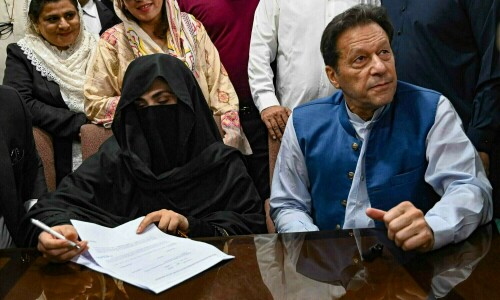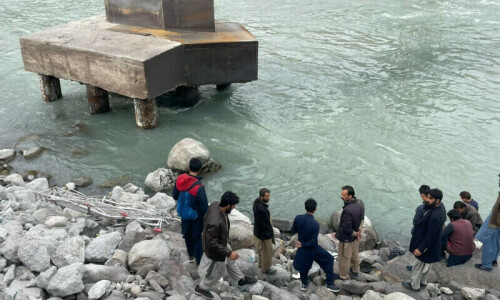THARPARKAR, July 11: When Pakistani labourer Mangal Ram’s children cry from hunger all he has to offer them is empty promises.
“My kids complain and cry for more food but what can I do?” said Ram, 50, a father of seven who lives in the desert village of Tharparkar, in the province of Sindh.
“We say ‘wait, we’ll cook more’, what else can we do?” he asks with a shrug.
Ram’s anguish is becoming increasingly common in Pakistan where inflation is running at about 20 per cent, led by fuel and food prices.
Soaring food prices and shortages of staples mean about 77 million people of Pakistan’s 160 million populations are food insecure, a 28 per cent increase over the past year, according to UN World Food Programme (WFP) estimates.
The term food insecure means people are unable to get sufficient food to meet dietary needs.
While there have not been serious foods protests in Pakistan, analysts say there is a danger anger could explode in a society that has already fallen prey to militants bent on bringing down the government.
Ram’s village is home to a Hindu community of about 100 families and has only one well and no electricity. Villagers grow barley and vegetables but if the rains fail, so do the crops.
To buy food, villagers have to walk several kilometres (miles) to a road where a bus runs once a day to the town of Mithi.
Isar Chand, 60, a teacher in the one-room village primary school says he has long stopped having breakfast.
“There’s no concept of breakfast. Some people drink water, some have tea. We have two meals a day,” said Chand.
“We eat roti (unleavened bread) with onion and chilli. When there’s no rain, we can’t have vegetables,” he said. “We can’t afford to take our sick to hospitals. We simply can’t pay for it. They die in pain.”
At times, villagers said they have nothing to eat but rab, a tasteless gruel of coarsely ground wheat mixed with water.
Chand said many villagers had been forced into debt, even those who leave to work as labourers.
“The biggest problem is raising prices,” he said.
“Whatever rations people buy after labouring are not enough for the whole year. Eventually they have to borrow money and then they have to keep paying it off for the rest of their lives.”
“DOOMED”: Pakistani city dwellers aren’t faring much better.
Sitting on a table outside his one-room house in a Karachi slum, 50-year-old Wali Khan is despondent about his children’s future.
“The next generation is already doomed. Only God can help them,” says Khan, a watchman and a father of 10 who earns about 8,000 rupees ($110) a month.
“We used to eat roti and dal (lentils) but now even that has become difficult. Look at the price of flour, oil and sugar. And then the children get sick. How can you expect us to afford it? And there are utility bills to pay too,” said Khan.
But the new government, led by the Pakistan People’s Party, says there is no food crisis.“We have no crisis, no shortage. We still have enough wheat. And will also be importing more,” said acting Food Minister Nazar Muhammad Gondal, a member of the PPP which for years has campaigned with a slogan of “food, clothing and shelter”.
Gondal said the 70 per cent of the population who live in rural areas were not affected by rising prices because they grow their own food.
“We’re not sleeping. We know the situation. There is no crisis. There are some parts in the NWFP (Northwest Frontier Province) where there is a problem of supply, but we will control it,” he said.
But security analyst Ikram Sehgal said anger over hunger could easily explode.
“When people see their kids going hungry, that is something that really arouses passion,” Sehgal said.
Several days of riots across the Sindh province after PPP leader Benazir Bhutto was assassinated in December was a taste of what could be in store, he said.
Nearly 50 people were killed and many millions of dollars of damage was caused by gangs of rampaging young men.
“Twenty per cent of them were grieving for Benazir but 80 per cent decided it was a good time for the have-nots to take on the haves,” he said.
Militants were already getting hungry children at their religious schools or seminaries, some of which are known to be breeding grounds for militants.
“Families just give their children away to the seminaries because they can’t feed them. They say ‘OK, at least the child will have food’. They can exploit this,” Sehgal said.
But for the time being at least, most Pakistanis seem to be facing the hardship with fortitude.
“Allah has given us this life so we are living it,” said Karachi slum dweller Khan.—Reuters











































Dear visitor, the comments section is undergoing an overhaul and will return soon.